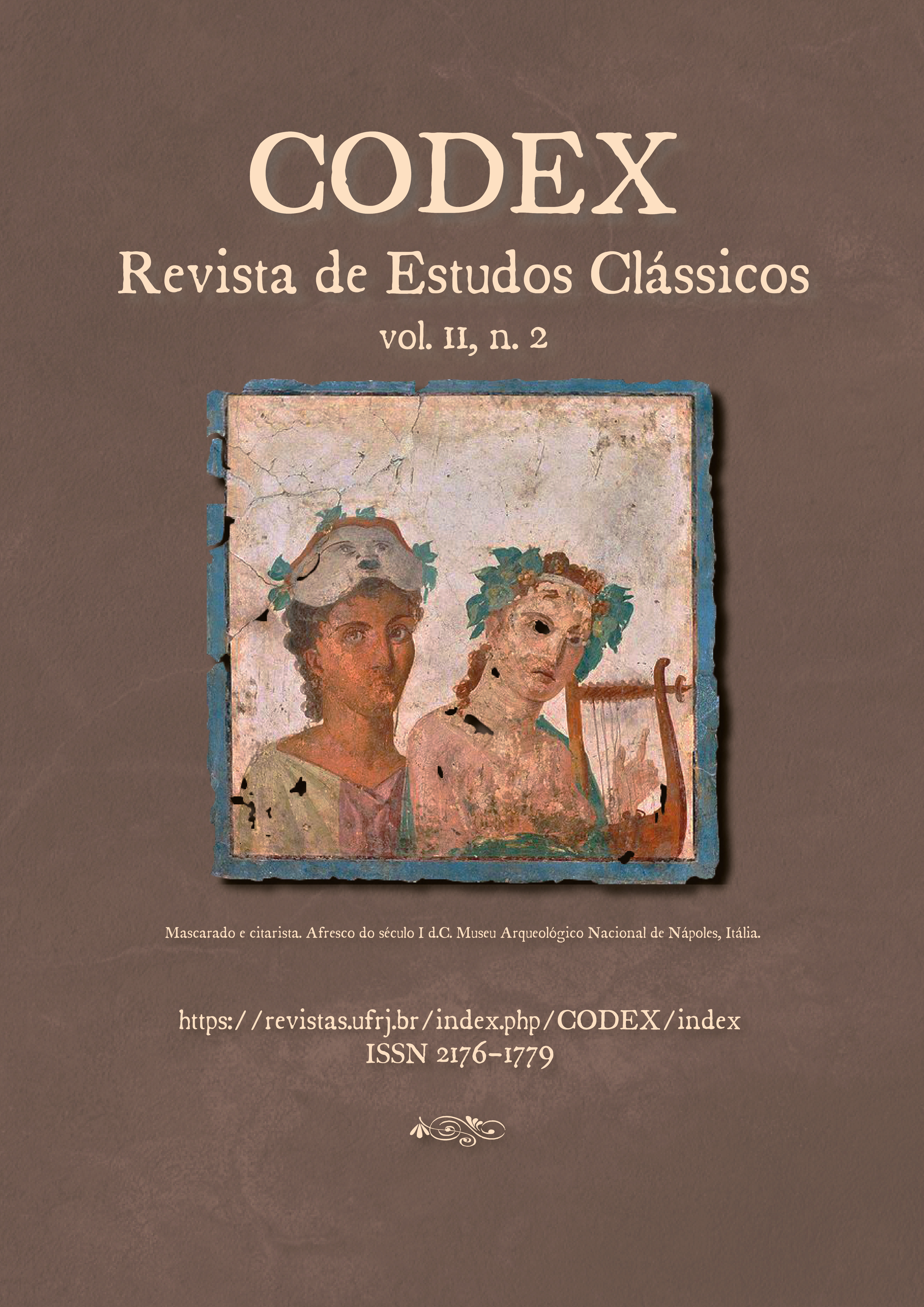The expression of happiness in the plautine comedy
DOI:
https://doi.org/10.25187/codex.v11i2.62406Keywords:
Plautus , Happiness, Positive PolitenessAbstract
In this article, we intend to investigate how the expression of happiness is shown in the speeches of the Plautine drama, in different scenes, as a resource that promotes the maintenance of the stock characters' positive face. We are particularly interested in analyzing Plautus' explicit use of gaudere, either in Sosia's empathic assertion in Amphitruo (vv. 957-961), or in the unsuccessful greeting between the senes of Trinummus (v. 51-54), or in communication in absentia from Dordalus to Toxilus in Persa (vv. 501-502), among other examples. Taking into account the scenic context and the perlocutions it provokes, we conclude that the functions performed by gaudere reduce the social distance between the interlocutors and allude to the social and religious commensality of the Vrbs.
Downloads
References
ALLEN, J. The Roman Republic and the Hellenistic Mediterranean: From Alexander to Caesar. Nova Jersey: John Wiley & Sons, 2020.
AUSTIN, J. L. How to do things with words. Londres: Oxford University, 1962.
AUSTIN, J. L. Quando dizer é fazer: palavras e ação. Trad. Danilo Marcondes de Souza Filho. Porto Alegre: Artes médicas, 1990.
BROWN, P.; LEVINSON, S. C. Politeness: Some universals in language usage. Cambridge: Cambridge University, 1987.
CAFFI, C.; JANNEY, R. W. Toward a pragmatics of emotive communication. Journal of Pragmatics, 22 (3-4), pp. 325-373, 1994.
DUCKWORTH, G. E. The nature of Roman Comedy. Princeton: Princeton University, 1952.
DUMÉZIL, Georges. La religion romaine archaïque: avec un appendice sur la religion des Etrusques. Paris: Payot, 1974.
ENNIUS, Q. The Annals. Ed. O. Skutsch. Oxford: Clarendon, 1985.
FANTUZZI, Marco; HUNTER, R. L. Tradition and Innovation in Hellenistic Poetry. Cambridge: Cambridge University, 2004.
FOWLER, W. W. The Religious Experience of the Roman People. Londres: Macmillan and Co., 1911.
FRAENKEL, Eduard. Plautine Elements in Plautus. Trad. DREVIKOVISK, Tomas; MUECKE, Frances. Oxford: Oxford University, 2007.
GÓMEZ, L. U. “Expressing happiness as a manifestation of positive politeness in Roman comedy”. In: van Gils, L.; Kroon, C.; Risselada, R. (ed) Lemmata Linguistica Latina, 2019.
HANSON, J. A. Plautus and Roman religion. Baltimore: John Hopkins University, 1959.
HUNTER, R. L. The New Comedy of Greece and Rome. Cambridge: Cambridge University, 1985.
LEECH, G. The pragmatics of politeness. Oxford: Oxford University, 2014.
LÓPEZ, M. L. “Nueva propuesta de cronología de las comedias de Plauto”. Florentia Iliberritana. Vol. 18. Granada: Universidad de Granada, 2007, pp. 203-235.
LOWE, Christy. The Use of Colloquial Language in the Portrayal of the Gods in Plautus’ Amphitryon (341-632). Birgmingham: Rosetta, 2015.
MANUWALD, Gesine. Roman republican theatre. Nova York: Cambridge University, 2011.
MOORE, T. J. Music, and Structure in Roman Comedy. Baltimore: The Johns Hopkins University, 1998, p. 245-73.
PLAUTUS, Titus Maccius. Plauti Comoediae. Ed. Fredericus Leo. Berlim: Weidmann, 1896.
RISSELADA, Rodie. Imperatives and other directive expressions in Latin: a study in pragmatics of a dead language. Amsterdã: JC Biegen, 1993.
ROSIVACH, V. J. Rudens and the power of discourse in The classical world. Baltimore: Johns Hopkins University, 2000, pp. 261-265.
SEARLE, J. R. Expression and meaning: Studies in the theory of Speech Acts. Cambridge: Cambridge University, 1979.
Taylor, Lily Ross. “The Opportunities for Dramatic Performances in the Time of Plautus and Terence”. Transactions and Proceedings of the American Philological Association, Vol. 68 (1937), pp. 284-304.
TOLIVER, H. M. The “fabulae palliatae” and the spread of the Hellenis. The Classical Journal, Vol. 49, No. 7. CAMWS, 1954, pp. 303-306.
WILKINS, J.M.; HILL, Shaun. Food in the Ancient world. Oxford: Blackwell, 2006.
Downloads
Published
How to Cite
Issue
Section
License
Copyright (c) 2024 Fellipe Duarte da Silva Alves de Souza

This work is licensed under a Creative Commons Attribution-NonCommercial 4.0 International License.
This work is licensed under a Creative Commons Attribution-NonCommercial 4.0 International License.










